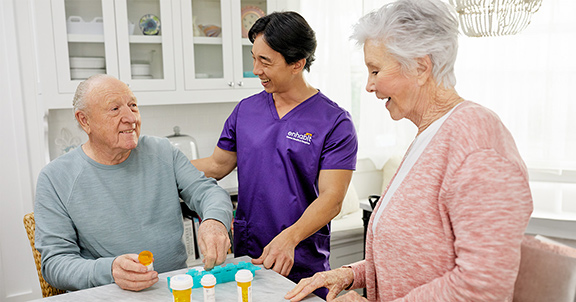Starting a new type of care can feel overwhelming, especially if you don’t know a lot about it. This can be the case with home health care because many patients don’t learn about home health until it is necessary for their recovery.
Home health can be a critical part of a patient’s health care journey as it allows them to receive the personalized care they need from the comfort of wherever they call home.
Enhabit Home Health & Hospice’s goal is to provide you with information so you can make informed health care decisions. Instead of letting the unknown stop you from getting the care you need, we’d like to break down the top five most common home health misconceptions.

What is home health?
Home health is designed to meet patients where they are. Whether it’s recovering from a surgery or recent hospital stay, or managing a disease or injury, it can provide the necessary care to help you achieve the best outcomes.
Home health requires the need for skilled services, which is medical care provided by licensed health care professionals. The home health team works closely with your physician to create a customized plan of care and regularly informs them of your progress.
Skilled care refers to nursing and therapy. Skilled nursing monitors your plan of care and provides necessary treatment, while physical, occupational and speech therapy help improve your functional abilities. Examples of skilled services include wound care, disease management, and patient and caregiver education.
Common home health misconceptions
If home health care is new to you, you may hold certain assumptions about it. To help you learn what care may be best for you, here are some common home health misconceptions and the truth behind each one.
Home health misconception 1: Home health care is only for people who are recovering from surgery
Home health is not exclusive to what type of injury you have. As long as you have a skilled need and your physician certifies you as homebound, you qualify for home health coverage under Medicare.
Often, this applies to patients who are recovering from surgery and need rehabilitation. But other medical events that may require home health care include:
- Exacerbation or onset of a new medical condition
- Medication changes requiring education or monitoring
- Pain impacting daily function
- Ulcers, wounds or lesions
- Limited functional activities of daily living
- This includes difficulty with managing medications, meal planning, communicating, bathing, dressing, walking, standing or sitting
- Risk of injury or harm
- Knowledge deficits related to the self-management of one’s present condition or the need for skilled teaching related to self-management of one’s present condition
- Impaired body functions or structures
- This includes impairments in breathing, circulation, activity tolerance, urination, memory, vision, strength, balance, cognition, edema or swallowing
Home health misconception 2: I have a family member caring for me so I don’t need home health
Having a home health care team is different than having a family member assist with your care. While a family member may help with hygiene routines or light housework, our team of skilled nurses, physical therapists, occupational therapists, speech-language pathologists, social workers and aides uses a coordinated approach to deliver specialized care in the comfort of home.
Additionally, our home health team provides education and training to family members or caregivers so that patients can learn how to better self-manage their condition.
Home health misconception 3: Home health care means losing my independence
Instead of thinking you are losing independence by relying on a home health care team, consider the perspective that home health can help you regain levels of independence. Through education and self-management strategies, you may learn how to cope differently with your condition or medical event, creating a different sense of independence.
During your time in home health care, you will also learn skills that you may be able to carry into your recovery. When you prioritize gaining or maintaining your levels of independence, it could lead to a greater quality of life, and you can adjust your goals to achieve what matters most to you.
Home health misconception 4: I can’t afford home health care
If you have Medicare, it covers home health services when you meet the qualifying circumstances. These include choosing a Medicare-certified agency, such as Enhabit, having a need for skilled services and being certified as homebound by your physician.
Once you have met the qualifying circumstances, Medicare will cover the cost of your home health services. Read more about home health Medicare coverage here.
If you don’t have Medicare, most commercial insurance companies will cover some of the costs associated with home health care. Contact your insurance provider to learn more about your benefits and home health coverage.
Home health misconception 5: Home health and hospice are the same thing
Although many home-based care companies, like Enhabit, provide both home health and hospice services, they are not the same type of care.
Home health is designed to meet patients where they are and get them the type of care they need to recover from a recent medical event or change in clinical condition. The goal is to deliver comprehensive care that helps patients meet their specific health care goals.
Although home health care focuses on treatment and outcomes, hospice is a philosophy of care that is more about comfort. The purpose of hospice care is to focus on and increase the quality of life for people facing a terminal illness, allowing patients to receive end-of-life care that is consistent with their wishes. This is often done through comfort measures and pain and symptom management.
How home health can help
If you are experiencing any signs that you may need home health care and have been certified as homebound by your physician, you may be eligible for home health services under Medicare.
Home health clinicians will educate you on your condition and provide practical management strategies to help you improve your quality of life and meet your specific health care goals. With their close access to your home environment, they can tailor your care plan to fit your lifestyle.
Click here to learn more about our home health services and find the care you deserve.
 Back to Resource library
Back to Resource library
Browse top categories
Social Share
At Enhabit our patients are our number one priority. From providing the latest medical practices to building deep personal connections, we’re focused on upholding every patient’s dignity, humanity and sense of control on their health care journey.
Home health
Our home health services give patients access to the care they deserve in the comfort of their own homes. From disease and injury management to recovery from surgery, our clinicians help patients confidently achieve their health care goals.
Hospice care
Our hospice care services place importance on the comfort of every patient living with a terminal illness. Our caring professionals are dedicated to providing not just physical care, but spiritual and emotional support to every patient and their loved ones.






